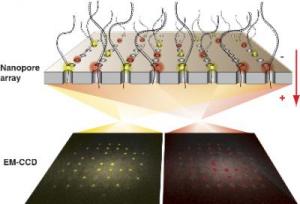Sep 16 2010
A team led by Boston University biomedical engineering researchers has won a $4.1 million, four-year grant from the National Institutes of Health to refine its nanoscale, low-cost, ultra-fast DNA sequencing method that could lead to individual genome sequencing for less than $1,000.
Developed in the past four years on an initial, $2.2 million NIH grant and led by Boston University Biomedical Engineering Professor Amit Meller, the project is one of 10 to receive funding from the NIH National Human Genome Research Institute (NHGRI) this year under its "Revolutionary Sequencing Technology Development—$1,000 Genome" program. The new NHGRI awards were announced this week.
 Using a novel method, Boston University biomedical engineer Amit Meller is able to draw several long strands of DNA simultaneously through nanopores, and read the base pair sequences optically.
Using a novel method, Boston University biomedical engineer Amit Meller is able to draw several long strands of DNA simultaneously through nanopores, and read the base pair sequences optically.
Since its founding in 2004, the $1,000 Genome program has produced innovations that have reduced the cost of genome sequencing from $10 million to $20,000, and cut the time needed to complete the process from a few months to a week. But reaching the $1,000 mark will require creative, unprecedented approaches.
Toward that end, Meller and his team have already demonstrated the first use of solid state nanopores—four-nanometer-wide holes in silicon chips that read DNA strands as they pass through—to optically sequence the four nucleotides that encode each DNA molecule. Their novel, highly efficient, optically-based method to detect single DNA molecules in nanopores could significantly reduce the cost of DNA sequencing and the time required to sequence a complete human genome.
"We are the first to employ optical detection from individual nanopores, and this allows us to probe multiple pores simultaneously using a single high-speed CCD camera," said Meller, referring to the charge-coupled devices that researchers use to obtain high-quality images. "As a result, our method can be scaled up vastly, ultimately allowing us to probe thousands of nanopores and obtain unprecedented DNA sequencing throughput."
Combining optical detection capability with the ability to analyze extremely long DNA molecules with superior sensitivity, the team's solid state nanopores are uniquely positioned to compete with current, third-generation DNA sequencing methods for cost, speed and accuracy. Unlike those approaches, the new nanopore method does not rely on enzymes whose activity limits the rate at which DNA sequences can be read; instead, readout speed is restricted only by current optical detection limits.
"This puts us in the unique advantageous position of being able to claim that our sequencing method is as fast as the rapidly evolving CCD/CMOS technologies," said Meller. "We currently have the capability of reading out about 100 bases per second, which is already much faster than other commercial third generation methods. This is only the starting point for us, and we expect to significantly increase this rate in the next year."
Licensing intellectual property from Boston University and Harvard University, Meller and his collaborators founded NobleGen Biosciences last February to develop and commercialize nanopore sequencing based on the new method. Researchers from the University of Massachusetts Medical School in Worcester are also working on the current project.
"Given the aggressive research and development effort that's now underway, I estimate that it will take less than five years to bring a highly competitive and cheap DNA sequencing to the medical marketplace" said Meller.
Source: http://www.bu.edu/eng/